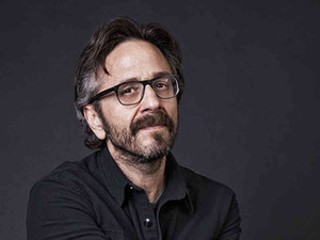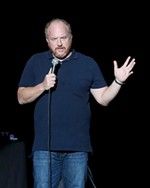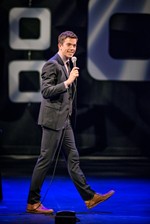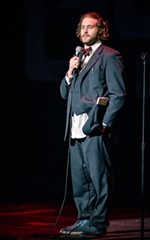Return to the Hipster Alamo
More Marc Maron: The comedian on WTF, SXSW, and the ATX
By Russ Espinoza, 12:01AM, Thu. Sep. 18, 2014

When festival organizers Funny or Die announced a stacked lineup for this year’s 20-date Oddball Comedy and Curiosity Festival, one name in the pantheon of elite comics stood out as the proverbial square peg: Marc Maron. After all, he's best known for wallowing in intimate confines, not bellowing in cavernous concert halls.
In 2013, Maron hand-picked a Greenwich Village basement showroom as the setting for his last comedy special, Thinky Pain, and recorded it before a full house of only several hundred. And while a contingent of his peers radiate boisterous personalities more conducive to Oddball’s heaping crowds and novel amphitheatre environment, Maron has flourished as a stand-up in recent years by forging a unique and deeply personal gather-round-the-campfire style that’s likened to the opening monologues from his wildly successful podcast, WTF.
Maron, 50, will co-headline Oddball’s final tour stop in Austin on Sunday, Sept. 21, at the Austin360 Amphitheater along with industry titans and friends Louis C.K. and Sarah Silverman. The event will also feature performances on the Main Stage by Hannibal Buress, Reggie Watts, and Whitney Cummings.
In part two of the Chronicle’s extended interview with Maron, the comedian-turned-podcast-host-turned-leading-man elaborates on his Oddball experience, and shares his thoughts on Austin, the grind of South by Southwest, and the process of growing into an everyday actor for his IFC original series.
Austin Chronicle: With all the big names populating a given tour stop this year, a lot of fans would like to be a fly on the wall backstage. So what’s the group dynamic been like between veterans like you, Louis, and Sarah, with the tour’s younger generation of comics?
Marc Maron: I mean, we’re hanging out backstage, you know – I’ve only done four of these, but sometimes people roll in at different times. Louis, definitely, he does his own transportation, flying on his own. So he sort of shows up a little later than everybody else. I was there for the first three (Oddball shows): Everybody was getting a feel for the situation. Everybody was feeling out their material. Jeff Ross was hosting. It was all pretty sociable. Everybody sort of stood backstage, watched each other. And it was good for me to catch up with Louis and Aziz (Ansari) and Hannibal (Buress).
But in terms of what ultimately happens back there: We’re all either watching each other or just kind of like hanging around in the dressing rooms or wandering around. I rode back in a car the other night with Sarah and Whitney, and I drove out with Demetri (Martin) – who I haven’t seen in awhile – so there’s a bit of catch-up going on. But in terms of a defined dynamic, we all sort of know each other. And I’ve never worked with Brent Morin – I’m seeing him work for the first time. It’s fun to go wander around – me and Jeff Ross wandered around the crowd down in Tampa – so it’s just random. I don’t know if there’s a way to really define that. But a lot of us know each other pretty well, but we don’t see each other a lot, so it’s always nice to have a reason to hang out and watch someone work and do that type of thing, because not everyone can do that – it’s pretty amazing.
Demetri Martin said to me the other night, after I got offstage, he said, "It’s pretty amazing that we used to see each other at the Luna Lounge in New York and now we’re at Red Rocks and I’m watching you be yourself." It’s pretty astounding. So there is a bit of nostalgia there for a lot of us: me and Sarah, and me and Louis as well, and Jeff. For a lot of New York people, it’s great. We knew each other as kids, so there’s that. Hannibal’s a character, and it’s great to be with Aziz. I don’t know them as well, but we’re all sociable. You know, there’s nothing weird going on back there.
AC: You don’t hesitate to call out and sometimes eviscerate obnoxious spectators. But how challenging has it been to do what you gotta do crowd control-wise in an open-air setting with over 15,000 people?
MM: That dynamic is really not there. In the sense that, when Jeffery was hosting he went out of his way – he made a cam out of it, out of his phone, and was sort of roasting people in the front row. Sarah went into the crowd. Brody (Stevens) goes into the crowd. But, for me, you can’t isolate one or two people in a venue that big – there’s no point to it. For me, the performing situation, which is tricky for me, is to sort of detach and see the crowd as a crowd and sort of move through what I’m doing up there. I don’t know about club intimacy around managing a crowd – I don’t even think about that. I’m not paying attention in that way. I’m trying to perform for everybody, and you have no idea what any individuals are doing in the crowd. It’s 10,000 people, dude.
AC: You performed at Red Rocks the other day (Sept. 7). Knowing your passion for music and the venue’s illustrious history hosting The Beatles, Jimi Hendrix, Radiohead, and so many others over the years, was taking that stage a particularly special experience for you?
MM: Yeah, I mean, I thought about all that. I talked about it when I went out there, but the interesting thing about Red Rocks, is … you do get the feeling that no matter what’s gone on there, the actual Earth is more powerful. (laughs) You know what I mean? There’s something about the setting that is transcendent, and in some weird way it’s almost larger and more amazing than the actual history of the place. It’s kinda cool to be where all those people have been, but you are fairly in awe of the setting in and of itself; and I couldn’t really, sort of, get past that. I did make light of the fact that all those people played there and there’s something in your mind that you wanna draw on, or at least be part of that history – which is amazing. But, there’s sort of an intimacy and a calm to that environment that I’ve never experienced before, so that really stood out.
AC: Between your appearances at South by Southwest Comedy and the Moontower Comedy Festival, you’ve been a regular visitor to Austin in recent years. What’s your assessment of this city?
MM: I like it almost always. I don’t really like being there during South-By, because it’s just … too, too much, you know? It’s exhausting. It’s hard not to feel as emotionally raped by the end of it. But, um, is that a little harsh?
AC: No, perfect. Keep going –
MM: But, you know, Moontower’s been great because it’s sort of a comic’s festival, and I think they’ve done a good job with producing that. I like going to Austin: I like driving around; I think it offers a lot of different sides of Texas. Even though I call it the ‘Hipster Alamo,’ I’ve spent a little time in Texas, in different places, and there’s definitely – it’s easy to sort of distance yourself from Texas because there’s a lot of Texas. But it is its own thing, and it is uniquely American and has its own integrity. I think that Austin is sort of a great mix of what Texas is in a weird way, but also has this weird hipster art contingent which balances out what could be awful. And, you know, it’s good for meat.
AC: You’ve acted in bit parts here and there throughout your career. But were there any growing pains involved in acting as a leading man – even though you’re playing yourself – for your IFC series, Maron?
MM: Oh yeah, yeah, definitely. And I sort of knew that would happen. I really had to, sort of, understand that. I’d never written for television. I’d never produced television. I’d never acted on television – or at all – to that degree, and I knew it was gonna be a big learning curve on all fronts; and all I could really do was show up and trust people to keep an eye on me.
I think the first season was a little stiff for me, but I didn’t think it was bad. I thought I honored who I am and made myself the character – almost. And then, second season, I was highly aware of making choices, and I watched the first season and tried to isolate what behaviors were sort of funny about me. I’m not sure I knew exactly what was funny about me an as actor or as somebody who is playing himself on TV. The second season I was a little more deliberate, a little more comfortable, and I had my buddy Dave Anthony on staff, and I trust him with the choices I was making, and I had him pay a little closer attention to what I was doing out there – same with the directors. I’m a very collaborative guy on set, and I just want to make sure I’m doing the best job I can. I think in the second season there was definitely a lot of growth in me as an actor. And hopefully in the third season, I’ll be even more comfortable and it’ll be great.
AC: You’ve been churning out 2-3 WTF episodes every week for more than five years. Do you have a sense of how much longer you’d like to keep working at it, at least at that clip?
MM: I think that’s a reasonable clip to work at, and, you know, I do see that and stand-up as my primary jobs. Now, the podcast, not only do I enjoy doing it, but it is my job. I’m my own boss, which is great. So I don’t really see an end to it; it’s really a question of how the show grows and keeping the quality up and broadening the conversation to other people. I don’t really think about it as ever ending. I don’t think about doing less episodes, really. It’s a great thing. It’s the best thing I’ve ever done, really. So, I don’t know why I’d want to stop it. (Laughs) It’s part of my livelihood now.
AC: What all do you have planned once the festival ends?
MM: I’m gonna make a television show. (Laughs) I gotta do 13 episodes of TV, so, you know, we start writing right after the festival ends, and we’re gonna shoot in the new year. And then this spring I’m gonna do a, sort of, modified tour. So what happens after Oddball is: writing television, shooting television, editing television, and then I’m gonna tour.
A note to readers: Bold and uncensored, The Austin Chronicle has been Austin’s independent news source for over 40 years, expressing the community’s political and environmental concerns and supporting its active cultural scene. Now more than ever, we need your support to continue supplying Austin with independent, free press. If real news is important to you, please consider making a donation of $5, $10 or whatever you can afford, to help keep our journalism on stands.
Scott Schinder, April 28, 2014
Dan Solomon, April 27, 2013
Russ Espinoza, Sept. 24, 2014
Russ Espinoza, Sept. 19, 2014
April 27, 2015
April 25, 2015
Marc Maron, Oddball Comedy and Curiosity Festival, Louis C.K., Sarah Silverman, Hannibal Buress, Reggie Watts, Demetri Martin












